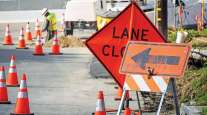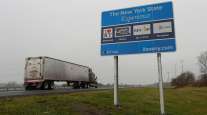Senior Reporter
House Leaders Urge White House to Enhance Disaster Preparedness

[Ensure you have all the info you need in these unprecedented times. Subscribe now.]
With wildfire and hurricane season underway, a trio of top House Democrats called on the White House to update its plans for responding to natural disasters during the coronavirus pandemic.
Reps. Peter DeFazio of Oregon, Frank Pallone of New Jersey and Eddie Bernice Johnson of Texas, the chairs of the Energy and Commerce, Transportation and Infrastructure, and Science, Space, and Technology committees, demanded the White House direct agencies to develop contingency plans focusing on storms, floods, fires and other extreme weather events amid the COVID-19 crisis.
The lawmakers emphasized such plans should include the full use of the Robert T. Stafford Disaster Relief and Emergency Assistance Act and the Defense Production Act.
VPOTUS.2020.7.16. Letter Re... by Transport Topics on Scribd
If a natural disaster occurs, the government must guarantee residents as well as emergency response workers that it is capable of distributing personal protective equipment and emergency supplies without depleting the supplies used by the medical sector tasked to the COVID-19 pandemic, the three leaders indicated.
They expressed concern that such a comprehensive plan for responding to a combination of disasters had yet to be outlined by the Trump administration.
“We request the White House order all appropriate federal agencies to create contingency and surge plans for how to support communities in the case of a compound threat scenario,” they wrote to Vice President Mike Pence on July 16. “Many of the same frontline workers, resources and infrastructure that are critical to fighting the pandemic are also necessary to natural disaster mitigation, preparedness, response and recovery,.
“Essential public and private sector personnel already stretched thin by the pandemic play vital roles in keeping communities safe and lifelines operational during natural disasters.”
The lawmakers continued, “Vulnerable individuals and households without access to a cool and safe environment, particularly in pollution-burdened communities, must be able to seek shelter from a heat wave and the pandemic from the safety of an air-conditioned location or receive assistance in creating a safe home environment for the duration of the pandemic.”
With America already overburdened by the #COVID19 pandemic, natural disasters stretch first responders even thinner. That's why Chairs @RepPeterDeFazio, @FrankPallone & @RepEBJ are urging the Trump admin to prepare for these compounding threats. https://t.co/RXGfNz1zpk — Committee on Transportation and Infrastructure (@TransportDems) July 16, 2020
Natural disasters that paralyze freight and passenger corridors typically lead to a surge in personal protective equipment. The coronavirus pandemic already has forced state officials to request myriad assistance for relief efforts.
Earlier this year, House Democrats proposed a bill that would ensure the federal government would cover costs of COVID-19-related Federal Emergency Management Agency assistance under major disaster declarations. The COVID-19 Cost Share Adjustment Relief Act of 2020 would remove financial obligations from state, municipal, tribal and territorial governments under declarations pursuant to the Stafford Disaster Relief and Emergency Assistance Act.
Meanwhile, FEMA announced it is prepared to tackle the impact of this year’s hurricane season, as well as other hazards during its COVID-19 response.

Transport Topics introduces its newest digital interview series, Newsmakers, aimed at helping leaders in trucking and freight transportation navigate turbulent times. Audience members will gain access to the industry's leading expert in their particular field and the thoughtful moderation of a Transport Topics journalist. Our second episode — "The Evolution of Electric Trucks" — featuring Nikola founder and executive chairman Trevor Milton, will air live on July 28 at noon EDT. Registration is free but advance signup is required. Sign up today.
The agency indicated in a report from May titled, COVID-19 Pandemic Operational Guidance for the 2020 Hurricane Season, “Although the operating environment has changed, FEMA’s mission of helping people before, during and after disasters remains the same. Federal, state, local, tribal and territorial officials, along with the private sector and nongovernmental organizations, must partner together to fulfill their respective missions and help disaster survivors.
“As the nation continues to respond to and recover from COVID-19 while posturing for the coming hurricane season, emergency managers must continue to operate under a framework of a locally executed, state managed and federally supported approach to incident stabilization.”
Recent extreme weather events, such as hurricanes and floods, have at times shut down key freight corridors and transit systems. In 2012, Superstorm Sandy destroyed coastal roadways and transportation infrastructure in the New York, New Jersey and Connecticut tri-state region.
Want more news? Listen to today's daily briefing:
Subscribe: Apple Podcasts | Spotify | Amazon Alexa | Google Assistant | More




